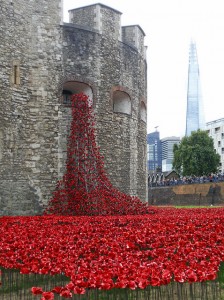
My eldest daughter has been set some special homework this week. With it being Remembrance Day and the centenary of World War I, she and her school friends have been asked to find out what role their families played in the conflict. I’m sure I’m not alone in this and that many parents have been researching and retelling war stories with their children.
Although I know a few tales, I haven’t been much use with regard to WWI. I’ve had to bend the rules and told her what I know my family did in both WWI and WWII. As I have some French heritage, I’ve been able to tell her one or two stories involving my French family which, I think, provides an entirely different perspective.
These stories have kept her gripped. She’s fascinated in them and has been asking me to tell more and more of them.
In some respects I’m not too surprised. As a young boy I was fascinated by my grandfather’s exploits fighting the Japanese alongside the Ghurkhas in what was then Imperial India (modern day Pakistan).
I was retelling these tales just yesterday, fitting, what with it being Armistice Day. As I was doing so, I realised this stuff is absolute gold that should be shared. Below are three stories. There are others but family politics dictates I’m best keeping them off the blog (sorry).
I hope you’ll agree this is a fascinating insight into what just one family went through in these conflicts. The stories I don’t know about must be legion.
Please do leave a comment or two at the end. I’d love to think this post might inspire others to tell their family’s stories too.
1) The flying ace
As a young boy I lived with my grandmother. Every now and again she would get emotional when talking about her brother and the reasons for this went over my head. With the benefit of age, I have a suspicion she was trying to shield me from what actually happened to him.
During WWII he was in the Royal Air Force and held the rank of Flying Officer. He was part of a Pathfinder crew.
Pathfinders were generally considered the best of the best and had a very risky role. They flew over enemy territory ahead of a bombing raid. Their job was to identify targets and drop flares so the bombers had a better idea what they were aiming for.
My family was, still is, immensely proud of the fact he was awarded the Distinguished Flying Cross. The newspaper clipping announcing the award took pride of place above my grandmother’s mantelpiece and, with her passing away some years ago, it has passed on to an aunt who continues to display it.
Regrettably, however, he never actually got to physically receive his service medal. His aircraft was shot down in early 1944. He was just 23 years of age.
He was the youngest of my grandmother’s many siblings and in later years I’ve discovered that she was very close to him when they were growing up. This is why she would occasionally get very upset when talking about him.
I have managed to do some research and discovered where his grave is. My mother hopes to visit it one day with her sisters and I hope they go through with it.
2) Thanks a lot dad…
My great, great grandfather was a successful figure in the worlds of business and agriculture, a real pillar of the establishment and a colourful character. He felt his family should be doing more to help the war effort during WWI and couldn’t understand why one of his sons hadn’t been called up for active service.
What does a patriotic man do in these circumstances? He writes to the War Ministry and asks why his son hasn’t been conscripted, that’s what.
I probably don’t need to tell you what happened next. He received a response instructing his son to report for duty. He was one of the lucky ones and returned from the war injured.
3) The French connection
The precise details of this tale have, unfortunately, become a bit fogged over time. The gist of the story, however, goes like this.
One of my French relatives was taken prisoner of war. While incarcerated, he somehow managed to have an affair with a woman and was punished for his actions.
The version I heard as a young boy was that he had an affair with a German. Did the Germans have female soldiers? I assume not and that being the case, who was she? The wife of an officer? Administrative staff? Was she in fact French and involved with the pro-Nazi Vichy authorities that ruled much of France? This story leaves so many questions unanswered.
Whatever happened and whoever she was, the powers that be took a dim view of this love affair. To separate the couple, this chap was forcibly marched across a large chunk of occupied Europe to a different prison camp.
I’ve heard varying versions; that he was marched from France to Poland, Germany to Poland, across Poland itself. Wherever he went, it was a very long journey.
Regardless, after the war he was demobbed and returned to his home village in France. Having been marched across so much of Europe, he declared he would never leave the village again.
There are three highlights. What did your family do? Please leave a comment, I’d be fascinated to know.
Photo: Amanda Slater. Image sourced from Flikr.com and reproduced under Creative Commons 2.0 agreement. For further information about Creative Commons and links to the agreement, see my disclosure page.










19 thoughts on “Daddy, what did our family do in the war?”
Fascinating stuff.
I’d have struggled with WW1 stories too, as I have no idea what any family members were really doing at that time.
My paternal grandfather was very much part of WW2 though.He served in the navy, and took part in the Allied invasion of north Africa, although the specific mission – Operation Reservist – was a disaster. 2 ships were to ram the protective boom in Oran Harbour, Algeria, and land a load of US marines who would capture the port and the (Vichy) French ships berthed there. Only problem was the French spotted the ships and blew them to smithereens. Grandpa got off, and but was captured and spent a few days as a PoW.
He was one of 3 brothers, all of whom saw active service and astonishingly all of whom survived
I’m very familiar with the operation in Oran as it happens. I’m just fascinated to read that your grandfather was involved in the operation. Very lucky for all three brothers to come home.
It is fascinating isn’t it? But also likely to get lost very quickly with that generation of relatives dying. The only story I really know is that of my granddad on my mum’s side who was in Burma, he worked as a chef in the navy and was always telling us stories about it. I wrote a little post about it a few years ago if you’ll forgive the link dropping http://mutteringsofafool.com/2011/11/11/lest-we-forget/
Great link dropping, I’m off to have a read!
I too have very little understanding of my family’s involvement in WW1, I know my grandfather served in WW2 and was shot in the eye so came home injured. I didn’t have that great a relationship with my grandparents on my father’s side, so didn’t press for detail and my dad didn’t share it with me. My mother’s mother though was a German conscript who was forced to work in the Luftwaffe munitions factories, before marrying a Scotsman and coming to England.
When I bought my wife home to meet my parents for the first time, my mother was telling her what my nan did during the war; my wife promptly asked my mum what her involvement in the war was and whose side she was on. When my mum explained she was born in 1958, my wife couldn’t have been more embarrassed.
I wonder if in 100 years people will be posting what their Grandparents did in Iraq and Afghanistan in a similar way, much smaller by scale, but just as significant in personal history. I’m not sure I want to tell my children the role I played in either of them, I’m not even sure I’ve come to terms with it myself yet.
Some very profound thoughts there Tony. There’s no denying that events in Iraq and Afghanistan have clearly been controversial and this can’t be easy on service personnel. There have also been significant successes. It’s simply the nature of conflict and I believe children will be sharing these stories.
From my own experience, I spent several hours transiting at Atlanta airport some years ago when US servicemen were returning home. I also got talking a while back to a British serviceman who was in the tank regiments and had served in Iraq.
The conversations I overheard in the arrivals lounge in Atlanta and the conversations I had with the British guy have certainly been etched in my mind and won’t be forgotten.
I love hearing about family histories, even if they’re not mine. I do know that my great grandfather was killed in Ypres in WW1. My great grandmother went on to marry his brother! #MMWBH
That, Christine, is quite a story! Anyway, I’m like you, I could listen to these stories all day.
Amazing post and so interesting. My Grandfather was an officer’s driver, however, my other Grandfather was a reserved occupation working as a ship’s plater on the Albert Docks. After a 40 hour shift he sent his team home for five hours for R&R. In that five hours the ship he was working on was bombed. Sadly, he got sent a white feather by a neighbour which really upset him but he was around 50-55 years at the time. My partner’s grandfather was a POW and we have the telegram which was originally sent to his wife informing he was missing presumed killed. Thankfully he returned. I have framed the telegram and have it on the wall. If only to preserve the letter but also to remind us of the sacrifice so many made. I loved reading your post so much. #MMWBH
Wow – some fascinating stories there. I, too, would be keeping a letter like that framed and I feel for your grandfather. A horrible thing to experience.
Grace & Lucas say – The Mothers read this post out to us. We have been doing a lot of work about WW1 & Remembrance at school and at home. We think your family were really brave and it was really interesting to read about your family. #MMWBH
Thank you for saying so Grace and Luca. I hope your school projects go well.
I also wish I had been in the room when your mums were explaining the bit about my French relative and his love affair!
Fascinating stories and so glad you have managed to pass your family stories on. I wonder what your great-great grandfather’s son thought about his dad making sure he was conscripted! I am sure your grandmother was very proud of her brother too but so sad that he was killed. The story of your French relative is very interesting too. I know that one of my relatives went AWOL whilst on military service and was sentenced to 6 months hard labour (was lucky not to get executed as so many others were) and I have visited the grave of a distant cousin killed during WW1. My grandfather served in the navy during WW2 but I know very little of what he did, other than my grandparents and dad spent much of the war in Bermuda.
Cool post! I have Great GrandFathers who fought in both the WW1 & WW2 which I am currently trying to find out more via genealogy websites and such, not at easy process! But this post was a fascinating read!
Thanks Debs. I know my aunt claims to know nothing about this stuff but when you quiz her, she tells the most amazing stories. Good luck on your quest!
Love reading family history, I’m useless at history (thank goodness for Google)! Thanks for linking up to #brilliantblogposts
Glad you liked reading the family history.
What a great post, John, it makes me feel ashamed how little I do know about my family’s involvement in either war. What I do know is that, much like your Grandma (bless her I feel so awfully sad for her, especially when I think of my own younger brother and our relationship) my Great-Grandma’s younger brother signed up for WW1 and was killed very soon after. He was underage and lied about his age.
My Grandfather drove one of those amphibious duck-boats onto the beaches of Normandy on D-Day. He didn’t talk about the war to me at all (or much else for that matter) but I know from others it was a terrifying experience for him.
On my husband’s side, one of his Grandmas was German, the other was at Bletchley Park when they broke the Enigma!
Anyway, thanks so much for this and for linking up to #TheList 🙂
Pingback: The list 12 Mums' Days